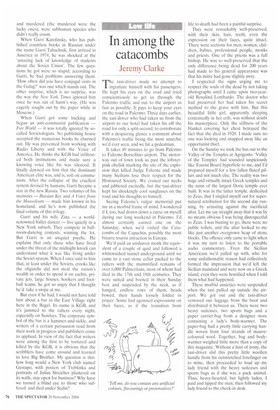In among the catacombs
Jeremy Clarke
rr he taxi-driver made no attempt to ingratiate himself with his passengers. He kept his eyes on the road and tried conscientiously to get us through the Palermo traffic and out to the airport as fast as possible. It pays to keep your eyes on the road in Palermo. Three days earlier, the taxi-driver who had taken us from the airport to our hotel had taken his off the road for only a split-second, to corroborate with a despairing glance a comment about Palermo's traffic being the most anarchic we'd ever seen, and we hit a pedestrian.
It takes 40 minutes to go from Palermo to Falcone-Borsellino airport. The motorway out of town took us past the lobsterpink obelisk marking the site of the explosion that killed Judge Falcone and made many Sicilians lose their respect for the Honoured Society. We craned our necks and jabbered excitedly, but the taxi-driver kept his shockingly cool sunglasses on the road and his thoughts to himself.
Seeing Falcone's vulgar memorial put me in a morbid frame of mind. I wondered if I, too, had drawn down a curse on myself during our long weekend in Palermo. I'd almost certainly earned one on the Saturday, when we'd visited the Catacombs of the Capuchin, possibly the most bizarre tourist attraction in Europe.
We'd paid an unshaven monk the equivalent of a couple of quid and followed a whitewashed tunnel underground until we came to a vast stone cellar packed to the rafters with the mummified remains of over 6,000 Palmeritans, most of whom had died in the 17th and 18th centuries. They were suited and booted in their Sunday best and suspended by the neck, as if hanged, endless rows of them, heads bowed, their hands loosely folded in prayer. Some had agonised expressions on their faces, as if the transition from life to death had been a painful surprise.
They were remarkably well-preserved, with their skin, hair, teeth, even the expression on their faces, quite intact. There were sections for men, women, children, babies, professional people, monks and priests. One of the priests was a full bishop. He was so well-preserved that the only difference being dead for 200 years had made to his general appearance was that his mitre had gone slightly awry.
respected the signs urging me to respect the souls of the dead by not taking photographs until I came upon two-yearold Rosalind Lombardo. The doctor who had preserved her had taken his secret method to the grave with him. But this beautiful little girl, apparently sleeping contentedly in her crib, was without doubt his masterpiece. Only the stillness of the blanket covering her chest betrayed the fact that she died in 1920. I made sure no one was looking and snapped away like an opportunist thief.
On the Sunday we took the bus out to the Valley of the Temples at Agrigento. 'Valley of the Temples' had sounded suspiciously like Tourist Board hyperbole to me, and I'd prepared myself for a few fallen fluted pillars and not much else. The reality was two huge and virtually intact Greek temples and the ruins of the largest Doric temple ever built. It was in the latter temple, dedicated to Zeus, that 1 singled myself out for supernatural retribution for the second day running, by urinating against the sacrificial altar. Let me say straight away that it was by no means obvious I was being disrespectful to Zeus. I was busting to go, there were no public toilets, and the altar looked to me like just another overgrown heap of stone blocks. The offence only came to light when it was my turn to listen to the portable audio commentary. Even the Sicilian Americans we'd palled up with, who for some unfathomable reason had collectively formed the impression that we'd left the Sicilian mainland and were now on a Greek island, even they were horrified when I told them what had happened.
These morbid anxieties were suspended when the taxi pulled up outside the airport. We got out and the taxi-driver removed our luggage from the boot and distributed it between us. There were two heavy suitcases, two sports bags and a paper carrier-bag from a designer store containing a lady's body-warmer. The paper-bag had a pretty little carrying handle woven from four strands of mauvecoloured wool. Together, bag and bodywarmer weighed little more than a copy of this magazine. Without a hint of irony, the taxi-driver slid this pretty little woollen handle from his outstretched forefinger on to mine, then proceeded to load up my lady friend with the heavy suitcases and sports bags as if she was a pack animal. Thus, heavy-hearted, but lightly laden, I paid and tipped the man, then followed my lady friend to the check-in desk.


























































































 Previous page
Previous page